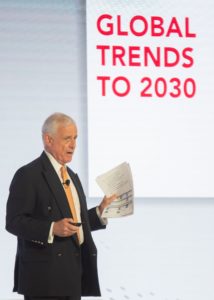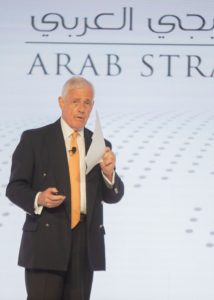ASF 2019: Centre Of Economic Gravity Shifts With Rise Of China, India, Southeast Asia
The growth of China, India and Southeast Asian countries is rapidly forming the basis of a major shift in the centre of economic gravity, said Sean Cleary, Chairman of Strategic Concepts and Founder and Executive Vice Chair of the FutureWorld Foundation, during a session titled ‘The World in 2030’ at the 12th Arab Strategy Forum (ASF 2019).
The session highlighted the megatrends set to shape the next decade, while examining the key implications of the trends on the GCC region.
The weakening of the United States’ hold on power, the disruption of the rules-based international order, geopolitical tensions on regional security landscapes, growing social disruption, weakening national governance and the first bio-digital technological revolution are all set to play a significant role in the world’s shifting power equation, Cleary pointed out.
The 2018 National Defense Strategy recognised the eroding of capabilities of the US military forces, compared to those of the country’s key adversaries. As a consequence, the United States’ ability to influence events in East Asia and Europe is also being undermined, said Cleary. The country could find itself playing a greatly diminished role internationally. This is bound to affect the countries of the GCC region that will need to develop multi-layered bilateral security arrangements, strengthen defensive capabilities against cyber and hybrid warfare, and renew efforts to instil a regional security order.
Another megatrend set to make an impact is the fracturing of the rules-based international order. “With the shifting economic landscape, there is a lack of a hegemon to impose rules, there are competing interests and contested legitimacy of decisions. This creates a need for the GCC states to engage in efforts that are actively looking to shape the new international order and build multifaceted alliances,” Cleary said. “The UAE can convene international youth gatherings to define the future and use Expo 2020 Dubai and major shift-inspiring events like the World Government Summit 2020 to help shape outcomes.”
The global security architecture created after World War II to contain the Soviet expansion has formed gaps between the Mediterranean and Central Asia, Russia’s ‘new abroad’ and China’s maritime periphery, causing geo-political tensions on regional security landscapes. To cope, Cleary said the GCC region must strengthen its defensive capabilities and actively explore the viability of a regional security arrangement.
Another trend shaping the future of the world is social disruption due to inequality of income and wealth that is likely to continue to rise. To prepare for this, the GCC nations will need to support under-resourced countries with skills development programmes to allow them to adapt and access new skills-based opportunities, and develop appropriate offshoring schemes, possibly in collaboration with other economies.
“Weakening national governance will take centre stage,” said Cleary. “With governments unsure of policy, deliberations will be rancorous. There is also a rise in neo-nationalism and populism, while the youth are impatient with slow decision-making. The GCC states must stay ahead of the curve and employ new instruments to understand and meet the economic and social needs of their citizens and residents.”
Wrapping up the session with a look at the first bio-digital technological revolution, Cleary said: “A huge technological revolution from research pipelines in ICT, biotechnology, nanotechnology and neurotechnology will shape the future. The world of work and education is radically disrupted. There is a need to take a relook at the education system – a revision of sorts. Investing in innovation and entrepreneurship is necessary. Public-private transitional partnerships to address under-resourced areas should be key to GCC states.”







